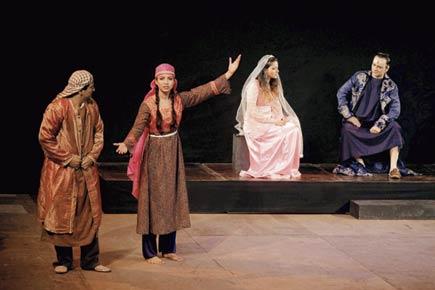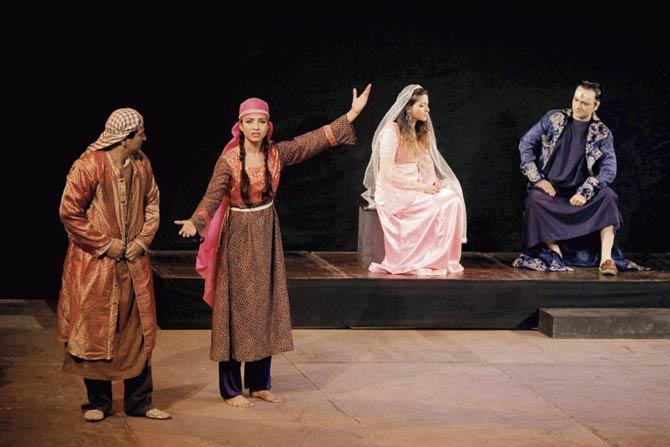Nadira Zaheer Babbar declares that there has been no finer qawwali written in Hindi films than Sahir Ludhianvi’s Yeh ishq ishq hai in Barsaat Ki Raat (1960)

 Nadira Zaheer Babbar declares that there has been no finer qawwali written in Hindi films than Sahir Ludhianvi’s Yeh ishq ishq hai in Barsaat Ki Raat (1960). It’s a very long piece (composed by Roshan), but as a sample there are the lines:
Nadira Zaheer Babbar declares that there has been no finer qawwali written in Hindi films than Sahir Ludhianvi’s Yeh ishq ishq hai in Barsaat Ki Raat (1960). It’s a very long piece (composed by Roshan), but as a sample there are the lines:
Mazhab-e-ishq ki har rasm kadi hoti hai,
Har qadam par koi deewaar khadi hoti hai
Ishq aazad hai, Hindu Na Musalmaan hai ishq,
Aap hii dharm hai aur aap hii imaan hai ishq
Jis se aage nahin sheikh-o-Brahaman donon,
Us haqeeqat ka garajtaa hua ailaan hai ishq
ADVERTISEMENT

A scene from the play Jaise Sookhe Huey Phool Kitaabon Mein Milien. Pic/Prashant Jadhav
In today’s intolerant times, for a song like this to get by without protest, tells of happier times, when people were willing to appreciate good poetry even in film songs. Babbar’s new play, Jaise Sookhe Huey Phool Kitaabon Mein Milien is about this respect for words and the beauty of language that is dying out.
Initially, she looks disappointed with the low turnout for the play. “People just want to see comedy or TV and film stars on stage,” she grumbles. By the end of the show, the audience gives it a standing ovation.
The idea of the production is very simple. A small town library is about to shut down and is selling its stock. The librarian couldn’t care less-she reads English books on her e-book reader. The Indian language books, she dismisses as junk. The only one who is sad about the demise of his beloved library is the self-named Mirza Ghalib, the peon (Hanif Patni).
An eager bibliophile (Jasjeet Babbar) comes to pick up some books for her own library and is thrilled at the variety of Hindi and Urdu literature that’s part of the collection. Then the poets and writers appear to talk to her, and the audience gets to hear some splendid poetry, set to music (by Amod Bhatt) and sung live. A lot of it is what we have learnt from our school Hindi text books, but some of it is recognizable, ironically, from film tunes, the very factor accused of corrupting public taste.
Bhakti poet Surdas’ memorable poem, “Maiya mori, maine hi maakhan khaiyo” is so familiar, because Anoop Jalota’s voice emanates from multiple speakers on Janmashtami. The 15th century poet who was blind, is renowned till today for his devotional songs dedicated to Lord Krishna.
Meerabai’s devotion to Krishna is also well-known - her mother’s throwaway remark about Krishna being her husband, made Meera reject her royal husband and spend her life writing beautiful poetry in praise of Krishna. (A fine selection of Meera bhajans was used in the film Jogan and those Bulo C Rani tunes are still sung). The only other female poet picked is Subhadra Kumari Chauhan, best known for her rousing tribute to Rani Laxmibai-Khoob ladi mardaani, woh to Jhansi wali rani thi.
The play skips Tulsidas and Kabir to pick Kalidas, the poet-playwright, whose Shakuntala is an immortal masterpiece. The scene in which a pregnant Shakuntala goes to meet Dushyant, and is spurned, because of Rishi Durvasa’s curse that stated that the man whose thoughts made her forget to greet him, would forget her. The other great playwright who finds himself in the play is Agha Hashar Kashmiri - with a thunderous scene from his play Yahudi Ki Ladki - whose ‘Parsi Theatre’ plays full of romance, intrigue, music, and a comedy track became a template for so much of early Bollywood cinema. He came to be known as the Urdu Shakespeare, not only because of his lavish costume dramas, but also his immaculate translations of several of the bard’s plays. Yahudi Ki Ladki, progressive for its times, has a Jewish girl challenge the might of the Roman Empire when she is betrayed by a Roman prince. (The story has been adapted several times for the stage, and at least two classic movies.) It has the terrific monologue by the girl’s father, from which the line, Tumhara khoon khoon, hamara khoon pani hai? is uttered a lot, without knowing the origins of the words.
No mention of Indian poetry can be complete without the illustrious mystic Amir Khusrau and Mirza Ghalib, the most prominent Urdu poet, who spent his life in penury, his poetry reaching the common citizenry through the singing of the tawaifs of the Mughal era.
The title of the play comes from Ahmed Faraz’s evocative romantic poem: Abke hum bichhde to shayad kabhi khwabon mein milein/ jaise sookh hue phool kitabon mein milein, but representing the other greats of classic Urdu poetry are Faiz Ahmed Faiz and Sahir Ludianvi - the latter laments that he came to be better known as a film lyricist instead of a poet, because so many of his poems were turned into film songs.
By the end of the show, the audience was thrilled at having being given a concise lesson in Hindi-Urdu literature, even though there can be so many more names added to the line-up of greats. This is the kind of production that should be taken across educational institutions so that young people get acquainted with their own culture. Similar stage productions can be attempted in other languages too, before the beauty of words in multiple Indian tongues is lost forever.
Deepa Gahlot is an award-winning film and theatre critic and an arts administrator. She tweets at @deepagahlot
 Subscribe today by clicking the link and stay updated with the latest news!" Click here!
Subscribe today by clicking the link and stay updated with the latest news!" Click here!







